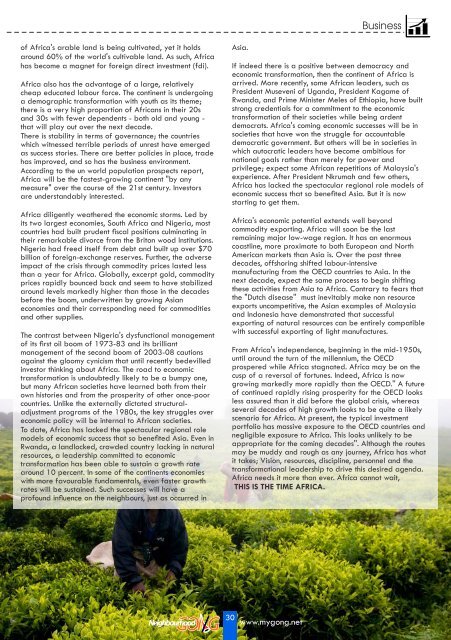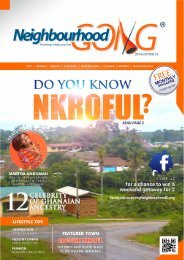Create successful ePaper yourself
Turn your PDF publications into a flip-book with our unique Google optimized e-Paper software.
Business<br />
of Africa's arable land is being cultivated, yet it holds<br />
around 60% of the world's cultivable land. As such, Africa<br />
has become a magnet for foreign direct investment (fdi).<br />
Africa also has the advantage of a large, relatively<br />
cheap educated labour force. The continent is undergoing<br />
a demographic transformation with youth as its theme;<br />
there is a very high proportion of Africans in their 20s<br />
and 30s with fewer dependents - both old and young -<br />
that will play out over the next decade.<br />
There is stability in terms of governance; the countries<br />
which witnessed terrible periods of unrest have emerged<br />
as success stories. There are better policies in place, trade<br />
has improved, and so has the business environment.<br />
According to the un world population prospects report,<br />
Africa will be the fastest-growing continent "by any<br />
measure" over the course of the 21st century. Investors<br />
are understandably interested.<br />
Africa diligently weathered the economic storms. Led by<br />
its two largest economies, South Africa and Nigeria, most<br />
countries had built prudent scal positions culminating in<br />
their remarkable divorce from the Briton wood Institutions.<br />
Nigeria had freed itself from debt and built up over $70<br />
billion of foreign-exchange reserves. Further, the adverse<br />
impact of the crisis through commodity prices lasted less<br />
than a year for Africa. Globally, excerpt gold, commodity<br />
prices rapidly bounced back and seem to have stabilized<br />
around levels markedly higher than those in the decades<br />
before the boom, underwritten by growing Asian<br />
economies and their corresponding need for commodities<br />
and other supplies.<br />
The contrast between Nigeria's dysfunctional management<br />
of its rst oil boom of 1973-83 and its brilliant<br />
management of the second boom of 2003-08 cautions<br />
against the gloomy cynicism that until recently bedevilled<br />
investor thinking about Africa. The road to economic<br />
transformation is undoubtedly likely to be a bumpy one,<br />
but many African societies have learned both from their<br />
own histories and from the prosperity of other once-poor<br />
countries. Unlike the externally dictated structuraladjustment<br />
programs of the 1980s, the key struggles over<br />
economic policy will be internal to African societies.<br />
To date, Africa has lacked the spectacular regional role<br />
models of economic success that so beneted Asia. Even in<br />
Rwanda, a landlocked, crowded country lacking in natural<br />
resources, a leadership committed to economic<br />
transformation has been able to sustain a growth rate<br />
around 10 percent. In some of the continents economies<br />
with more favourable fundamentals, even faster growth<br />
rates will be sustained. Such successes will have a<br />
profound inuence on the neighbours, just as occurred in<br />
Asia.<br />
If indeed there is a positive between democracy and<br />
economic transformation, then the continent of Africa is<br />
arrived. More recently, some African leaders, such as<br />
President Museveni of Uganda, President Kagame of<br />
Rwanda, and Prime Minister Meles of Ethiopia, have built<br />
strong credentials for a commitment to the economic<br />
transformation of their societies while being ardent<br />
democrats. Africa's coming economic successes will be in<br />
societies that have won the struggle for accountable<br />
democratic government. But others will be in societies in<br />
which autocratic leaders have become ambitious for<br />
national goals rather than merely for power and<br />
privilege; expect some African repetitions of Malaysia's<br />
experience. After President Nkrumah and few others,<br />
Africa has lacked the spectacular regional role models of<br />
economic success that so beneted Asia. But it is now<br />
starting to get them.<br />
Africa's economic potential extends well beyond<br />
commodity exporting. Africa will soon be the last<br />
remaining major low-wage region. It has an enormous<br />
coastline, more proximate to both European and North<br />
American markets than Asia is. Over the past three<br />
decades, offshoring shifted labour-intensive<br />
manufacturing from the OECD countries to Asia. In the<br />
next decade, expect the same process to begin shifting<br />
these activities from Asia to Africa. Contrary to fears that<br />
the "Dutch disease'' must inevitably make non resource<br />
exports uncompetitive, the Asian examples of Malaysia<br />
and Indonesia have demonstrated that successful<br />
exporting of natural resources can be entirely compatible<br />
with successful exporting of light manufactures.<br />
From Africa's independence, beginning in the mid-1950s,<br />
until around the turn of the millennium, the OECD<br />
prospered while Africa stagnated. Africa may be on the<br />
cusp of a reversal of fortunes. Indeed, Africa is now<br />
growing markedly more rapidly than the OECD.'' A future<br />
of continued rapidly rising prosperity for the OECD looks<br />
less assured than it did before the global crisis, whereas<br />
several decades of high growth looks to be quite a likely<br />
scenario for Africa. At present, the typical investment<br />
portfolio has massive exposure to the OECD countries and<br />
negligible exposure to Africa. This looks unlikely to be<br />
appropriate for the coming decades''. Although the routes<br />
may be muddy and rough as any journey, Africa has what<br />
it takes; Vision, resources, discipline, personnel and the<br />
transformational leadership to drive this desired agenda.<br />
Africa needs it more than ever. Africa cannot wait,<br />
THIS IS THE TIME AFRICA.<br />
30 www.mygong.net
















